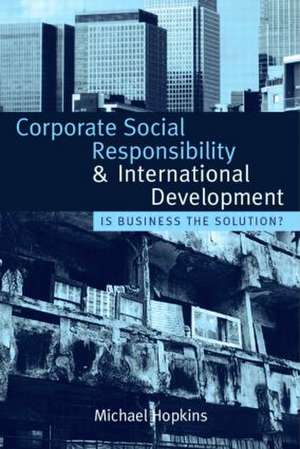Corporate Social Responsibility and International Development: Is Business the Solution?
Autor Michael Hopkinsen Limba Engleză Paperback – 31 oct 2008
| Toate formatele și edițiile | Preț | Express |
|---|---|---|
| Paperback (1) | 417.36 lei 6-8 săpt. | |
| Taylor & Francis – 31 oct 2008 | 417.36 lei 6-8 săpt. | |
| Hardback (1) | 1003.43 lei 6-8 săpt. | |
| Taylor & Francis – noi 2006 | 1003.43 lei 6-8 săpt. |
Preț: 417.36 lei
Nou
79.87€ • 86.73$ • 67.09£
Carte tipărită la comandă
Livrare economică 23 aprilie-07 mai
Specificații
ISBN-10: 1844076105
Pagini: 262
Dimensiuni: 156 x 234 x 20 mm
Greutate: 0.48 kg
Ediția:1
Editura: Taylor & Francis
Colecția Routledge
Locul publicării:Oxford, United Kingdom
Cuprins
Can CSR Pave the Way for Development? * What is CSR all About and Where is it Going? * Corporate CSR Development Case Studies: Failures and Success * Failures of Development: A Global View * Corporations Should Abandon Philanthropy and Concentrate on CSR * A Critique of CSR and Development * CSR and Poverty * Supply Chain Issues * CSR in developing countries * Limitations of International Agencies * Socially Responsible Investment in Developing Countries * Main Actions for Companies Involved in Development * Index
Notă biografică
MICHAEL HOPKINS is CEO of MHC International Ltd (London and Geneva), a research and service company that specializes in social development issues for the public and private sector. He is also Professor of Corporate and Social Research at Middlesex University Business School, UK, Visiting Professor at Brunel University, UK and author of The Planetary Bargain (2003, Earthscan).
Recenzii
'Set to become a seminal work on the subject.' African Business 'Challenging and important issues, readably presented.' Long Range Planning 'A daring attempt at integrating two worlds: international business and development ... In this groundbreaking book, Hopkins provides a detailed, albeit sympathetic explication of multinational enterprises (MNEs) through the lens of CSR ... A bold attempt to merge the policy and practice of CSR with international development ... a comprehensive introduction to the main themes of CSR and international development.' Critical Perspectives on International Business 'The subject of the book is clearly important and deals with an area of thought little explored in the field of development studies: how the private sector, through Corporate Social Responsibility, can foster development. Now a very experienced and distinguished development economist addresses the question, and does so with a high academic standard and with a very incisive examination of current ideas and of institutions, both governmental and international. It is clearly written, with plenty of wit and humour? Delightful to read.' Emilio Klein, Professor of Economics, University of Santiago, Chile and former Director, Institute of Labour Studies (ILO) in South America 'At last, the case for how big corporations might move beyond charity to meet the 21st century's biggest challenge: poverty. How many more Henry Fords, Bill Gateses and Warren Buffetts are we willing to waste in the shantytowns of the developing world? All they need is what every successful corporation (and democracy) has ? business expertise and the legal means to organize and expand productively.' Hernando de Soto, President of the Institute for Liberty and Democracy, Lima, Peru, and author of The Mystery of Capital and The Other Path 'Very readable, well referenced and thought provoking.' Adrian Payne, Head of CSR, British American Tobacco 'Mike Hopkins has never been afraid to question conventional wisdom. His book steps into areas that we in the ILOare taking very seriously, and provides a different perspective which raises important questions for business, governments, the UNsystem and others concerned with international development.' Dr Gerry Rodgers, Director, ILO, Geneva
Descriere
The business of business is business. So why should corporations be involved in development? This groundbreaking new book makes the case that governments and their international agencies, grouped under the umbrella of the United Nations, have failed in their attempts to rid the planet of underdevelopment and poverty. If development is the objective then it seems that the solution and the responsibility lies with the private sector - particularly through the Corporate Social Responsibility (CSR) programmes of large corporations, with their tremendous power and economic strength. Written by noted CSR practitioner Michael Hopkins, this book is the first to explicitly link CSR with development. It spells out what corporations are doing on development, what more they could do and how CSR can be a useful tool to promote economic development via corporations. This is important and challenging reading for all of those in government, business and NGOs who think that there must be a better, more effective and dynamic way to kick-start development and eradicate poverty.
















